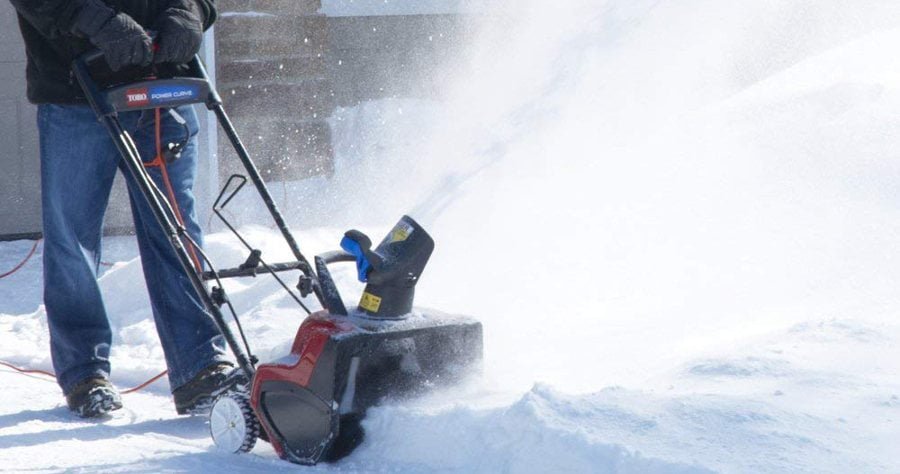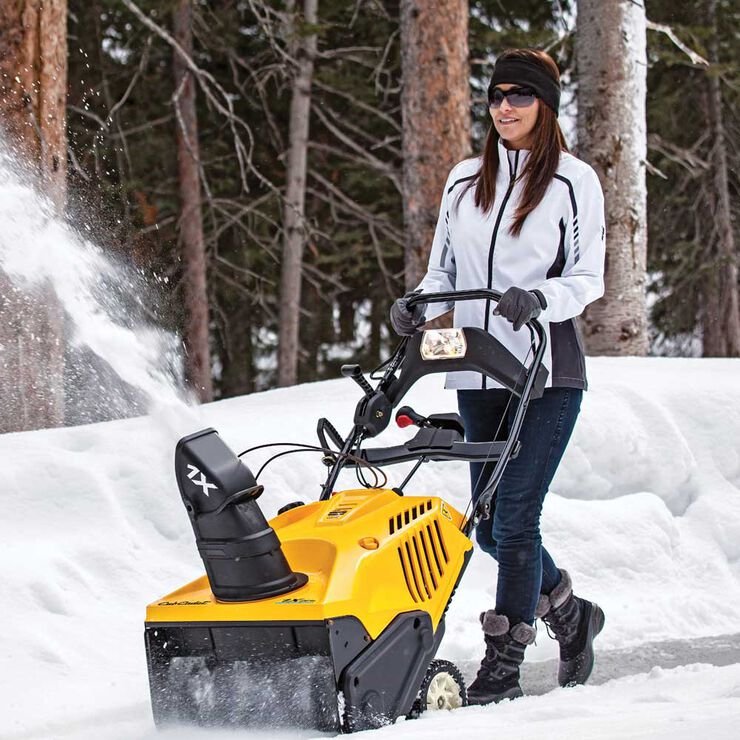Winter means snow, and a snowblower or mini snow plough is must-have equipment in this season. In some parts of the world, heavy snow covers almost everything around the house, and cleaning them manually is painstaking. Snowblowers are a wonderful invention that helps you save time and energy when clearing snow.
If you are thinking about investing in a snowblower and contemplating which type to get, we have got you covered here. Below, we have discussed both types of snow blowers in detail to better understand their functions and features to make your purchase decision wisely.
What is an Electric Snow Blower?
Most buyers are likely not aware that electric snow blowers exist. As the name suggests, electric snow blowers are run by corded electricity. That means you have to keep it plugged in a nearby outlet while it’s cleaning the snow. Since handling electric cords is risky and a hassle, some manufacturers have made battery-powered electric blowers. In this case, you have to charge the snowblower, use and recharge it again.
Electric snow blowers can clean light to medium snow within a small surface area. Their lightweight body is built to clean light, fluffy snow.
Advantages:
Electric snow blowers have a lot of great things to offer. They are inexpensive, so they can easily fit into your budget. Also, they operate quietly and un-disturbingly. We all know that fuel fumes are heinous for human health and nature. When that contaminated air is breathed, many fatal diseases occur. So, they are eco-friendly as no fumes are released.
Thanks to their lightweight, you can easily maneuver them and store them in a compact place. In addition, they don’t require frequent maintenance, which makes them cheaper to maintain.
You can easily clean off your patio, balcony, garden, or backyards with an electric snowblower, as they are meant for smaller surface areas with lighter snow. Moreover, with the cordless electric blowers (battery-powered), you can walk further away as there is no hassle with plug points and cords.
Disadvantages:
Of course, there are some concerns as well regarding electric snow blowers. These are made lightweight, for which their operating power is much lower and has lesser traction. It means they cannot clean heavy snowfall that is deeper than one foot and cannot move along massive snow. Moreover, you cannot use it to clean wet snow because moisture and electricity do not go well together. Electric snow blowers overheat very quickly, so you might have to take breaks in between.
For the corded ones, you are limited by the length of the cord while moving. Also, you must always keep an eye on the cord to make sure it does not tangle around things. While there is no hassle of cord for the rechargeable ones, charging a snowblower takes three times as much time compared to refilling a gas snowblower. So, it is time-intensive.

Things to know before buying an electric snowblower:
Here are a few things to know before you think of buying an electric snowblower.
- Must have a stable electrical connection: Your home must have a stable electricity connection accessible from where you will want to use the snowblower. You don’t want the electricity to disturb your work in-between.
- Corded or battery-powered: Both have the same efficiency, capacity, and durability; only the operating power is different. If you don’t have electrical outlets outside your house, then you can buy the battery-powered models. However, battery-powered ones are still low in supply as a limited number of manufacturers distribute them.
- Snowfall range in your area: Electric snow blowers are a wise investment if you live in a low snowfall area. They cannot clean in bulk, heavy and deep snow. If you make them clean more than their capacity, the machines will overheat or burn out in the worst cases.
- Maintenance: Maintaining an electric snowblower is easy. After winters are over, you only need to store them properly with the cord detangled so that you can use them again in the next winter.
What is a Gas Snow Blower?
Gas snow blowers are traditional blowers that operate with gas-powered engines. You need to fuel the engines with gas or oil to use it. Then you need to refill it again for further usage. Some of the top gas blowers are reviewed at https://libertysnowblowers.com/.
Stay assured that they don’t have any hassles of electricity, cords, or finding a power outlet, like electric snowblowers.
Advantages:
Gas snow blowers are a boon to those who are the sufferers of massive snowfall every winter. When the roads, lawns, and yards are all covered with snow, the hefty power of gas blowers is enough to clean them up quickly. They are durable, self-propelled, and have high traction to take the load of cleaning snow on themselves. Moreover, gas snow blowers are safe and best to use to clean wet snow as well.
In addition, gas snow blowers are available in many sizes to choose from. They are durable and do not overheat themselves.
Disadvantages:
Even the best snow blowers have some disadvantages too. Some concerns regarding them are that they are hefty, bulky, and large; so, they require a lot of space to be stored. Also, they are not portable like the electric snow blowers, which means you cannot carry them around. They are a very expensive investment indeed. Moreover, their maintenance costs are costly too.
On the other hand, as they operate with fuel, so they emit toxic perfume. It means gas snow blowers are not environmentally friendly. Last but not least, their biggest drawback is that they are extremely noisy.

Things to know before buying a gas snowblower:
Now let’s see some of the things that you need to know while buying a gas snow blower.
- Availability of fuel in your area: Since gas snow blowers run on fuel (gasoline, oil), so make sure that specific fuel is available in your area when you need it.
- Snowfall range in your area: Gas snow blowers are exorbitant. So, you only want to spend on it when it serves the purpose. As they are very powerful and can clean a hefty amount of snow at once, so only buy them if your area has heavy snowfall during winters.
- Maintenance cost: Gas snow blowers not only have high upfront costs only but high maintenance costs also. The gasoline or oil must be refilled often, the spark plugs need replacements when damaged, and the fuel system must also be constantly maintained even if you don’t use them for months. All these will cost a chunk in the blower’s lifetime.
- Noise tolerance: Can you tolerate deafening noises? Can your neighbors tolerate it? You must be aware that gas snow blowers make extreme noises when operating.
Pros and Cons: Electric vs. Gas
Let us summarize the benefits and drawbacks of both types of snow blowers so that you can compare them better.
Electric Snow Blowers:
Pros:
- Affordable compared to gas snow blowers
- Much lighter to carry and easy to handle
- Provides quiet operation than gas blowers
- Requires low maintenance
- Don’t require gasoline or engine oil
- Does emit fumes
- Eco-friendly
- Takes less space, hence easier to store
- Most models nowadays come in chargeable versions
Cons:
- Hassle of pulling the cord through the snow
- Cord length limits usage
- Might overheat quickly
- Not suitable for places with unstable electricity
- Cannot work with over a foot of snow
- Water and electricity do not get along, so they cannot be used in wet snow
- The lightweight body reduces traction
- Cannot work on heavy snowfall
- The chargeable ones may need frequent charging depending on the use
Gas Snow Blowers
Pros:
- Made extremely durable
- Can handle heavy and wet snow effortlessly
- Very powerful
- No hassle of cords; so, limitless usage
- It comes in a wide variety of sizes
- More traction due to heavy built
- Has advanced controls and features
- Some models are self-propelled
- Easy to service when needed
Cons:
- Extremely noisy while operating
- Prices are exorbitant compared to electric models
- Not portable due to large size and weight
- Needs regular maintenance
- Costly to operate as they require fuels
- Releases gas fumes
- It takes more storage space
Final thought: Which one to choose?
Now that you have all the facts and figures about both types of snowblowers, which one would you pick? We suggest you consider the amount of snowfall in your area before considering other factors while picking a snowblower. Nevertheless, you want to get the job done you are buying the blower for, which is cleaning snow.
If your area has heavy snowfall, then definitely go for the gas snow blowers, as the electric ones cannot clean snow deeper than a foot or so. On the other hand, if your area has light snowfall, you can invest in an electric snowblower. So, choose your snowblower wisely!


















